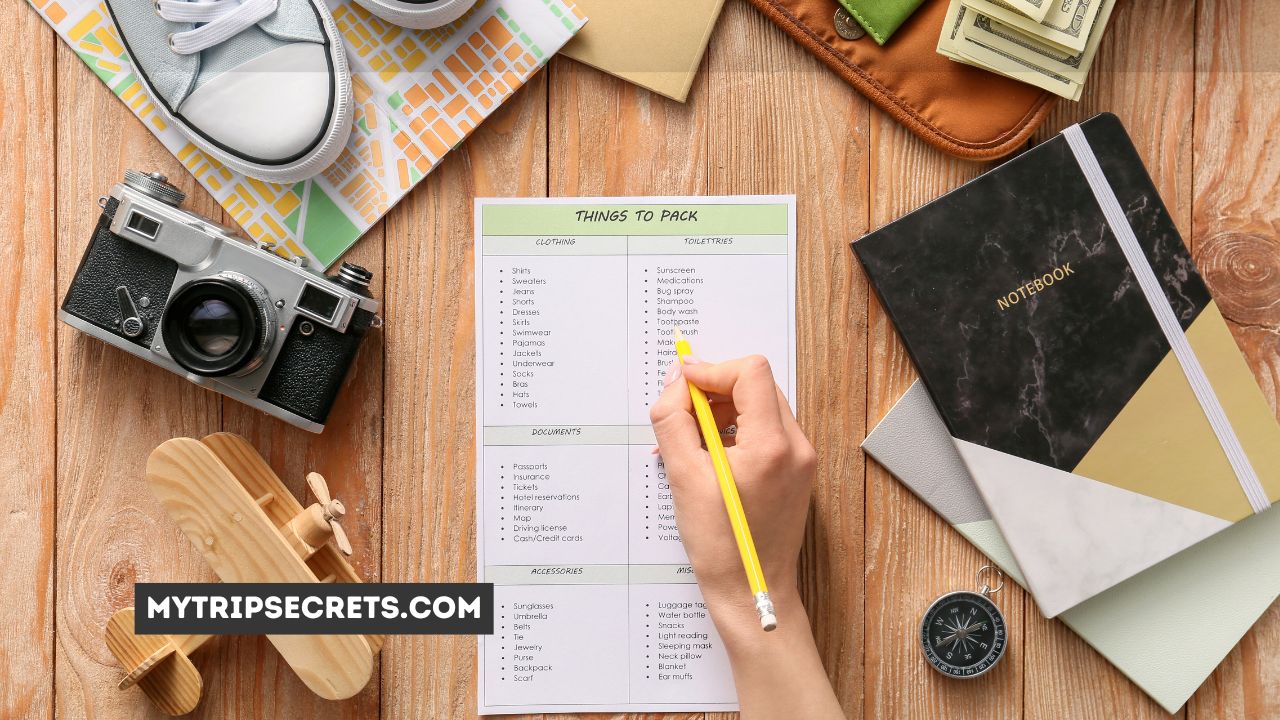Going to Spain for study abroad? International moves take more planning than vacations. Long-term living abroad means no easy access to familiar brands and stores. This comprehensive packing list ensures you stay productive in school, comfortable in Spain, connected to family, and safe in a new place. Bringing the right technology, health supplies, travel paperwork, and weather gear eases transfers into Spanish student housing, schools, and culture while retaining focus on the amazing voyage ahead. Use this approach to pack stress-free for specific needs.
Contents
Study Abroad Packing List Spain: PDF Checklist
| Category | Top Items | Checked |
|---|---|---|
| Clothing | Tops | ☐ |
| Bottoms | ☐ | |
| Shoes | ☐ | |
| Layering pieces | ☐ | |
| Electronics | Laptop/tablet | ☐ |
| Phone | ☐ | |
| Plug adapters | ☐ | |
| Headphones | ☐ | |
| Student Essentials | School supplies | ☐ |
| Textbooks | ☐ | |
| Language translator | ☐ | |
| Self Care | Medications | ☐ |
| Toiletries | ☐ | |
| Health insurance documents | ☐ | |
| Luggage | Suitcase | ☐ |
| Backpack | ☐ | |
| Packing cubes | ☐ | |
| Luggage scale | ☐ | |
| Documents | Passport | ☐ |
| Student visa | ☐ | |
| University letter | ☐ | |
| Money | Debit/credit cards | ☐ |
| Cash | ☐ | |
| Exchange rate app | ☐ | |
| Insurance | ☐ |
Download Study Abroad Packing List Spain PDF Checklist
Clothing
Carefully choose versatile pieces and lightweight layers suitable for walking between university buildings in a range of warm to cool weather.
Tops
- 5 short sleeve shirts/blouses
- 3 long sleeve shirts
- 2 sweaters – 1 lightweight, 1 medium
- 1 jacket
Bottoms
- 2 pairs jeans
- 1 pair pants
- 2 pairs shorts
- 1 skirt
Undergarments
- 10 pairs undergarments
- 4 bras
- 6 pairs socks
Shoes
- 1 pair comfortable walking shoes
- 1 pair nice sandals
- 1 pair flip flops for showers
Accessories
- 2 scarves
- 1 hat
- 1 pair fabric gloves
Table 1: Recommended clothing items and quantities for study abroad term in Spain by category
| Clothing Type | Recommended # of items |
|---|---|
| Tops | 8-10 |
| Bottoms | 5-6 |
| Undergarments and socks | 15-20 |
| Shoes | 3 |
| Accessories | 3-5 |
Electronics
In our digital world, electronic essentials enable both productivity and fun.
Laptop/Tablet
A lightweight laptop or tablet facilitates taking notes in lectures or the field. Tablets also substitute for heavy textbooks via ebook downloads.
Smartphone
A smartphone assists daily tasks like translations, directions, activating public transport tickets, mobile payments and messaging home. Getting a local SIM card avoids expensive roaming fees.
Chargers
Bring compatible chargers for all electronics. Power strip adapters easily connect multiple devices. Portable chargers add insurance against losing juice when outlets access is limited.
Plug adapters
Spain utilizes 220 volt electricity with European Type C or Type F outlets, not North American plugs. Use all-in-one adapters covering major plug configurations rather than single-type converters which can still leave your charger prongs exposed.
Headphones
Noise-canceling headphones create quiet study spaces nearly anywhere without bothering others and avoid listening fatigue on long bus, plane or train rides. Secure carrying cases prevent damage in transit.
Student Essentials
Arriving prepared with items for academic success ensures you hit the ground running at your university in Spain.
School Supplies
Stock up on pens, pencils, highlighters, sticky notes, small stapler, hole punch, index cards, binders, notebooks and any other study aids you routinely utilize at home. Stationery stores in Spain offer limited selection with unfamiliar brands. Bring more than you expect needing.
Textbooks
Check if able to access required texts online through university libraries or resources to minimize bulk while traveling. For books unavailable digitally, buy used rather than full price where possible. Consider e-readers that consolidate carrying many thick textbooks.
Language Apps/Guidebooks
Begin mastering Spanish through interactive language apps with handy offline accessibility like Google Translate for signing, speaking and understanding when out around your new community. Supplement with bilingual paper dictionaries and basic phrasebooks.
Backpack
A sturdy backpack holds essentials securely while walking between university buildings and public transit stops. Look for compartments suited to organizing study materials along with room for a sweater, snacks, umbrella, and water bottle.
Self Care Items
Maintaining health and wellness aids success during demanding academic schedules far from your usual support systems.
Medications
Keep taking any prescriptions and include over-the-counter pain/fever relievers, antacids, antihistamines/allergy meds, antidiarrheal agents and laxatives, antifungal treatments, bandages, rubbing alcohol, and a thermometer.
Toiletries
Pack adequate tampons/pads, skin care routine products travel-sized, preferred shampoo/conditioner, hair styling appliances with international plug adapters as needed, small hairdryer or towel turban, contacts/solution/glasses, extra toothbrush/toothpaste, and any special cosmetic or hair products difficult to source abroad.
Health Insurance Documents
Carry medical insurance cards plus emergency phone numbers for health and security assistance services associated with your study abroad program or university. Confirm coverage details like approved local hospitals and any exclusions particular to Spain or pre-existing conditions. Download an app like Medibuddy organizing insurance credentials digitally in one secure place.
Luggage/Packing Aids
Choosing suitable luggage and tools speeds packing/unpacking during travels.
Suitcase/Duffel
Pack completed outfits including shoes inside packing cubes in a sturdy wheel aboard suitcase durable enough for plane journeys and cobblestone streets. For weekend trips, add a foldable duffel bag that compresses to store beneath a dorm bed when not in use. Soft sides conform to crammed luggage racks on European trains.
Backpack/Daypack
In addition to your bookbag for academics, carry a comfortable backpack or lightweight daypack on shorter excursions. Handy features include anti-theft lockable zippers, RFID blocking card slots, side water bottle pockets and rain covers in case of unexpected showers while sightseeing.
Packing Cubes/Shoe Bags/Laundry Bag
Use packing cubes/folders/sleeves to organize categories within luggage like toiletries, underwear, tops and bottoms to efficiently access items. Shoe bags isolate dirty soles from clothing to minimize mess. A lightweight nylon laundry/dust bag makes transporting used clothes to wash easier.
Luggage Scale
Weigh suitcases before departing to avoid excess baggage fees. Portable digital luggage scales attach to handles for weighing then tuck in your pack taking up little room.
TSA Locks
Secure luggage during transit with TSA approved combination or key locks easily opened by screeners to reduce concerns if bags are inspected then relocked after checks.
Documents
Confirm you have mandatory documentation current and readily accessible in case authorities request proof of status.
Passport
Ensure your passport is valid for at least six months beyond the end date of your expected stay with blank pages for any border stamps and visas. Make copies of the ID page to keep separate in case the original is lost or stolen. Scan and email a copy to yourself as a digital backup.
Student Visa
If required for your enrollment terms and nationality, obtain appropriate student visas in advance through Spanish consular offices. Add visa pages carefully to your passport with visa details available when arriving at airports or other ports of entry.
University Acceptance Letter
Carry the original written confirmation of acceptance at your Spanish university for the upcoming term. This helps demonstrate ties if questioned when entering Spain as a student rather than tourist including financial means to support studies abroad.
Accommodation Details
Keep documentation of arranged housing whether in university dormitories or off campus apartments on hand to provide local addresses to authorities if asked.
Emergency Contacts
Record phone numbers for campus security staff, program coordinators, family members and any medical/mental health resources provided for international students by the university. Note numbers can be dialed free using WiFi/data if cellular coverage fails.
Rail Passes/Discount Cards
Consider eligible discounts like youth or teacher rail passes for affordable trips around Europe during breaks. The ISIC international student ID unlocks travel savings, reduced museum fees and more across Spain.
Money Matters
Manage finances responsibly while abroad with access to backup funds in case of emergencies.
Debit/Credit Cards
Inform your bank of upcoming foreign travel to prevent account freezes from unusual activity abroad. Carry at least two debit/ATM cards linked to accounts with sufficient balances for daily expenditures plus contingency savings. Enable rare use text alerts for fraudulent transactions.
Cash
Have 200-300 Euros accessible in cash inside a concealed money belt or neck pouch as immediate currency for taxis, small shops/cafes or automatic ticket kiosks temporarily unable to process cards. Research typical costs before determining amount.
Exchange Rates App
Download multi-currency apps like XE currency converter tracking real-time exchange rates to help understand true costs when budgeting and shopping.
Travel Insurance
Consider supplemental policies beyond basic health coverage addressing trip cancellation, lost baggage, flight delays plus emergency medical transport home and 24/7 travel assistance services.
Frequently Asked Questions
How much luggage can I bring to Spain?
Most airlines allow 1 checked bag around 50 pounds maximum plus a smaller carry on bag fitting overhead bins and personal bag like a backpack or purse. Transportingexcess luggage between rental units or on Spain’s speedy high speed trains proves challenging. Pack selectively with adaptable layering pieces and travel sized toiletries rather than outfits for every scenario.
Should I bring electric appliances like hair dryers from home?
Spain utilizes different electrical outlets and 220V current compared to North American 120V standards. Bring universal plug adapters, but purchase appliances meant for dual voltages to prevent short circuits or blowing fuses in local networks. Many hotels supply hairdryers and basic kitchen tools if arranged through university housing services.
What types of shoes should I pack?
Pack comfortable walking shoes with arch support for cobblestone streets and hilly university campuses. Add dressier sandals and an extra pair of casual sneakers in case one gets wet. Don’t forget waterproof boots during cooler winter months!
Can I drink tap water in Spain?
Yes – unlike some developing regions, Spain’s public water supply from treated municipal sources is potable from sinks, drinking fountains and restaurants.Nevertheless, filtering or boiling questionable sources never hurts. Carry a reusable filtered water bottle to cut plastic waste.
How much money will I need each month besides tuition?
Student dormitories including some meals average around €500-800 monthly. Personal expenses like snacks, entertainment, clothes and weekend travel commonly total €300 more. Set an initial monthly budget with some flexibility until establishing local routines. Pursue paid on campus jobs when eligible for added income abroad.
Conclusion
Studying overseas immerses you in new cultures and perspectives, both enriching educational paths and personal worldviews. Packing smartly eases transitions into students life in Spain, allowing you to focus energy on incredible opportunities ahead. With language aids connecting across barriers, lightweight tech tools supporting scholastics, necessities maintaining health plus financial resources for enrichment activities between academics, you’ll embark on amazing journeys where questions spark curiosity, not concern. ¡Buena suerte!
Additional Packing Inspiration:

